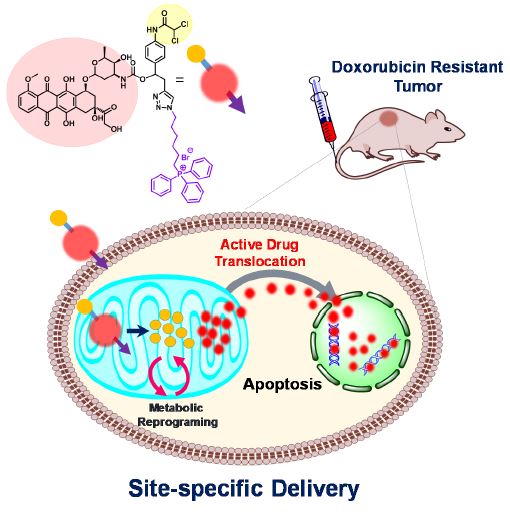Overcoming Drug Resistance by Targeting Cancer Bioenergetics with an Activatable Prodrug
| author | Jong Seung Kim |
|---|---|
| Homepage | http://orgchem.korea.ac.kr/ |
| journal | Chem (Cell press) DOI:https://doi.org/10.1016/j.chempr.2018.08.002 |
Nearly without exception, all known cancer chemotherapeutics elicit a resistance response over time. The resulting resistance is correlated with poor clinical outcomes. Here we report a new approach to overcoming resistance that involves reprogramming oncogene-directed alterations in mitochondrial metabolism prior to drug activation while simultaneously circumventing drug efflux pumps. Conjugate C1 increases cancer cell apoptosis and inhibits regrowth of drug-resistant tumors as inferred from efficacy studies carried out in human cancer cells and in Dox-resistant xenograft tumor models. It also displays minimal whole animal toxicity. These benefits are ascribed to an ability to evade chemoresistance by switching cancer cell metabolism back to normal mitochondrial oxidative phosphorylation while helping target the active Dox to first the mitochondrion and then the nucleus.
https://www.cell.com/chem/fulltext/S2451-9294(18)30329-2
« Prev Accurate Quantification of N-glycolylneuraminic Acid in Thera...
 Accurate Quantification of N-glycolylneuraminic Acid in Thera...
2018.11.12by webmaster
〈
Accurate Quantification of N-glycolylneuraminic Acid in Thera...
2018.11.12by webmaster
〈
Janus Nanoparticle Structural Motif Control via Asymmetric Ca... Next »
 Janus Nanoparticle Structural Motif Control via Asymmetric Ca...
2018.11.12by webmaster
〉
Janus Nanoparticle Structural Motif Control via Asymmetric Ca...
2018.11.12by webmaster
〉
Articles
-
 Harnessing Intramolecular Rotation to Enhance Two‐photon Imaging of Aβ Plaques Th...
Harnessing Intramolecular Rotation to Enhance Two‐photon Imaging of Aβ Plaques Th...
-
 Proteogenomic Characterization of Human Early-Onset Gastric Cancer
Proteogenomic Characterization of Human Early-Onset Gastric Cancer
-
 Chemiluminescent Probe for the In Vitro and In Vivo Imaging of Cancers Over-Expre...
Chemiluminescent Probe for the In Vitro and In Vivo Imaging of Cancers Over-Expre...
-
 Molecularly Controlled Stark Effect Induces Significant Rectification in Polycycl...
Molecularly Controlled Stark Effect Induces Significant Rectification in Polycycl...
-
 A New Approach for Large-Area Thermoelectric Junctions with Liquid Eutectic Galli...
A New Approach for Large-Area Thermoelectric Junctions with Liquid Eutectic Galli...
-
 Nanometric Water Channels in Water-in-Salt Lithium Ion Battery Electrolyte
Nanometric Water Channels in Water-in-Salt Lithium Ion Battery Electrolyte
-
 Topotactic Transformations in an Icosahedral Nanocrystal to Form Efficient Water-...
Topotactic Transformations in an Icosahedral Nanocrystal to Form Efficient Water-...
-
 Fluorescence enhancement of a ligand-activated fluorescent protein induced by col...
Fluorescence enhancement of a ligand-activated fluorescent protein induced by col...
-
 Elucidating the Role of Molecule-Electrode Interfacial Defects in Charge Tunnelin...
Elucidating the Role of Molecule-Electrode Interfacial Defects in Charge Tunnelin...
-
 PDMS-Coated Hypercrosslinked Porous Organic Polymers Modified via Double Postsynt...
PDMS-Coated Hypercrosslinked Porous Organic Polymers Modified via Double Postsynt...
-
 Accurate Quantification of N-glycolylneuraminic Acid in Therapeutic Proteins Usin...
Accurate Quantification of N-glycolylneuraminic Acid in Therapeutic Proteins Usin...
-
 Overcoming Drug Resistance by Targeting Cancer Bioenergetics with an Activatable ...
Overcoming Drug Resistance by Targeting Cancer Bioenergetics with an Activatable ...
-
 Janus Nanoparticle Structural Motif Control via Asymmetric Cation Exchange in Edg...
Janus Nanoparticle Structural Motif Control via Asymmetric Cation Exchange in Edg...
-
 Deconvolution of Tunneling Current in Large-area Junctions Formed with Mixed Self...
Deconvolution of Tunneling Current in Large-area Junctions Formed with Mixed Self...
-
 Electron heating and thermal relaxation of gold nanorods revealed by two-dimensio...
Electron heating and thermal relaxation of gold nanorods revealed by two-dimensio...
-
 (Semi)ladder-Type Bithiophene Imide-Based All-Acceptor Semiconductors: Synthesis,...
(Semi)ladder-Type Bithiophene Imide-Based All-Acceptor Semiconductors: Synthesis,...
-
 Dendrite-Embedded Platinum–Nickel Multiframes as Highly Active and Durable Electr...
Dendrite-Embedded Platinum–Nickel Multiframes as Highly Active and Durable Electr...
-
 Mid-Infrared Intraband Transition of Metal Excess Colloidal Ag2Se Nanocrystals
Mid-Infrared Intraband Transition of Metal Excess Colloidal Ag2Se Nanocrystals
-
 Enhanced Electron Transfer Mediated by Conjugated Polyelectrolyte and Its Applica...
Enhanced Electron Transfer Mediated by Conjugated Polyelectrolyte and Its Applica...
-
 Vertex-reinforced PtCuCo ternary nanoframes as efficient and stable electrocataly...
Vertex-reinforced PtCuCo ternary nanoframes as efficient and stable electrocataly...
Designed by sketchbooks.co.kr / sketchbook5 board skin
